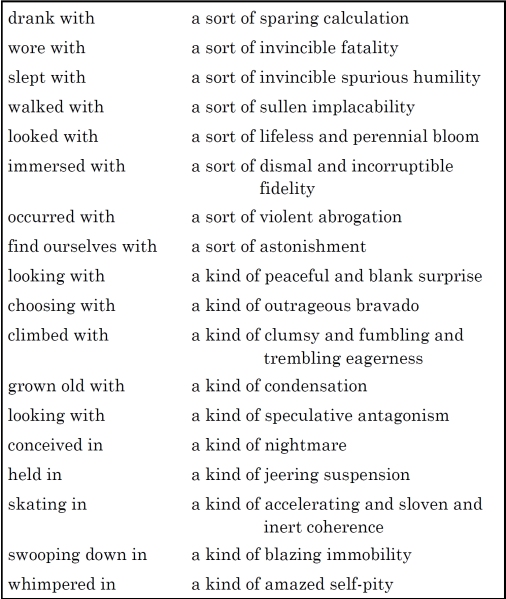Absalom, Absalom!’s descriptions often read like the prose equivalent of cinematic soft focus—what with every sort of and kind of like another layer of mystifying gauze between the camera and its subject (not “astonishment” but “a sort of astonishment”; not “condensation” but “a kind of condensation”), or the oft-used some imparting its diffused aura of amorphousness to all variety of topics (“some interval of sanity,” “some blind instant of revolt”) like Vaseline smeared on the lens to better enshroud in a forgiving haze the aging star at which it’s aimed.
The eyes of an Absalom! character, then, are not simply visionary and alert—they have “a quality at once visionary and alert.” A moment of contemplation is not just peaceful and harmless—it has “that quality peaceful and now harmless.” An object is not solid and permanent but possesses “a quality almost of solidity, permanence.” A voice, not tense, suffused, and restrained, but “with its tense suffused restrained quality.”
Maintaining this level of quality are such further examples as “the quality of curiosity,” “the very sober quality of his gestures,” “that quality of gaunt and tireless driving,” “some puny quality of faint heat,” and “the unbearable quality of bloodlessness.” There is a “quality dark and sullen,” a “quality stale static and moribund,” and a “quality strange, contradictory and bizarre.”*
A dream is described as having “that logic- and reason-flouting quality,” which is, of course, “the very quality upon which it must depend to move the dreamer.” One character’s crooked stance has “some quality, some gathering of [his] still laxed and hunched figure,” while, in a winter scene, we are told “the chill had a compounded, a gathered quality” (which highlights a quality that wind chill and poor posture have in common, i.e., gather seems like a weird word to use to describe either one).
I’ve mentioned before that Absalom! has more than its fair share of swaggering—or, perhaps I should say, in keeping with the current topic, “that quality still swaggering but without braggadocio or belligerence.” (Without belligerence? you might ask, to which the book would reply, from later in the same sentence: “the quality had never been belligerence.”) Or perhaps, if quality is needing a bit of a breather, I could tag in an equally shapeless synonym to do its work and say instead “a swaggering gallant air”—air as in “an air dreamy remote and aghast” or “his air grim, haggard, and tatter-ran” or “an air Cassandralike and humorless and profoundly and sternly prophetic.”**
This air fare also includes “that air of scaling desolation,” “that air of children born too late into their parents’ lives,” and “that air which had nothing whatever of furtiveness in it,” plus the “grim mausoleum air of puritan righteousness” and an “air something between a casual and bitterly disinterested spectator.” (Strange to think what spectacle one must be rubbernecking at to be disinterested and bitter about it.)
Air features most frequently as a component in the Mad Libs equation of “air of” + frequently used adjective + other frequently used adjective + angsty noun. Witness “air of tranquil and unwitting desolation,” “air of curious and paradoxical awkwardness,” “air of impotent and static rage,” “air of sardonic and indolent detachment,” and—maybe not so angsty here with the noun but…again with the indolent ?—“air of indolent and lethal assurance.”***
A weatherbeaten but plucky house is lucky enough to get the tag-team treatment from both soft-focus filters—“a little shabby, and yet with an air, a quality of grim endurance.” Which is, like, Warren Beatty treatment. Or, as Robin Williams waggishly dubbed Barbra Streisand’s 1996 vanity project, “The Mirror Has Two Key Lights.”
• • •
*I realize the comma usage in these excerpts is also strange, contradictory, and bizarre, but I’m trying to reproduce them faithfully.
**As compared to, in a different chapter, “a Cassandra-like listening beyond closed doors” (sic on the hyphen here, which does not figure in “air Cassandralike”). Nor are these Cassandra’s only appearances in the book.
***Okay, lethal and unwitting are not used all that frequently. Curious, impotent, paradoxical, sardonic, static, and tranquil, though—easily 80 occasions among them.
